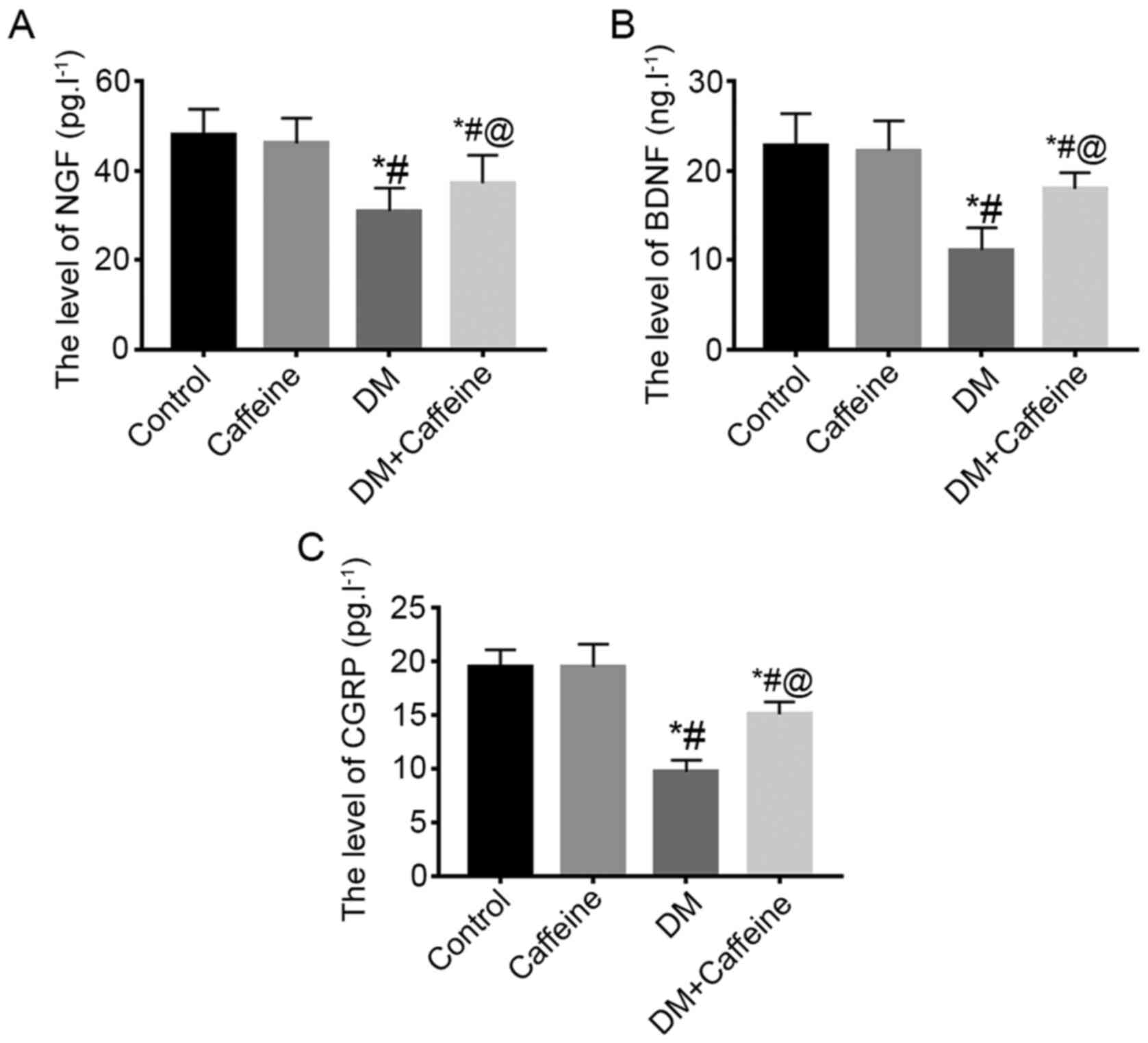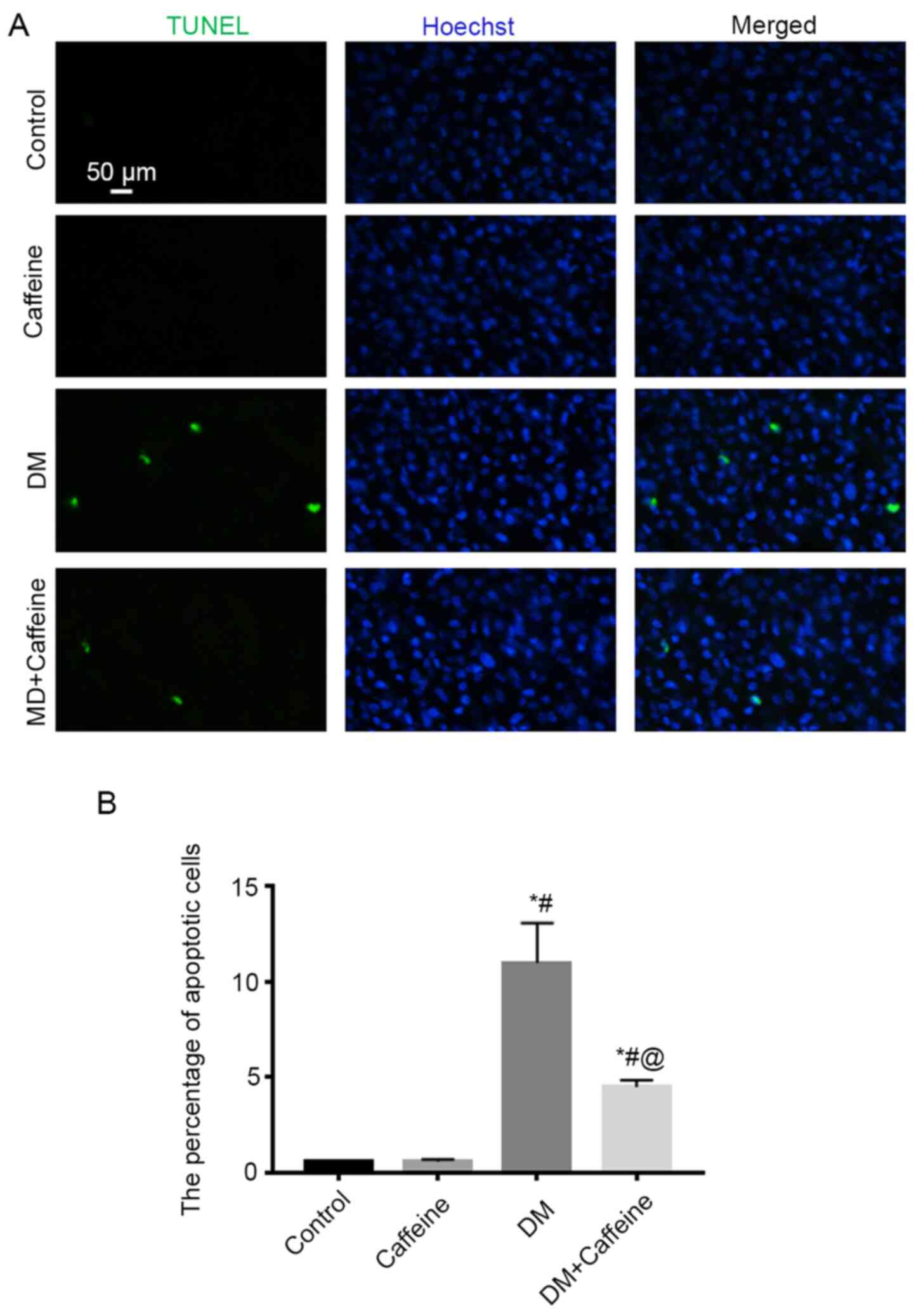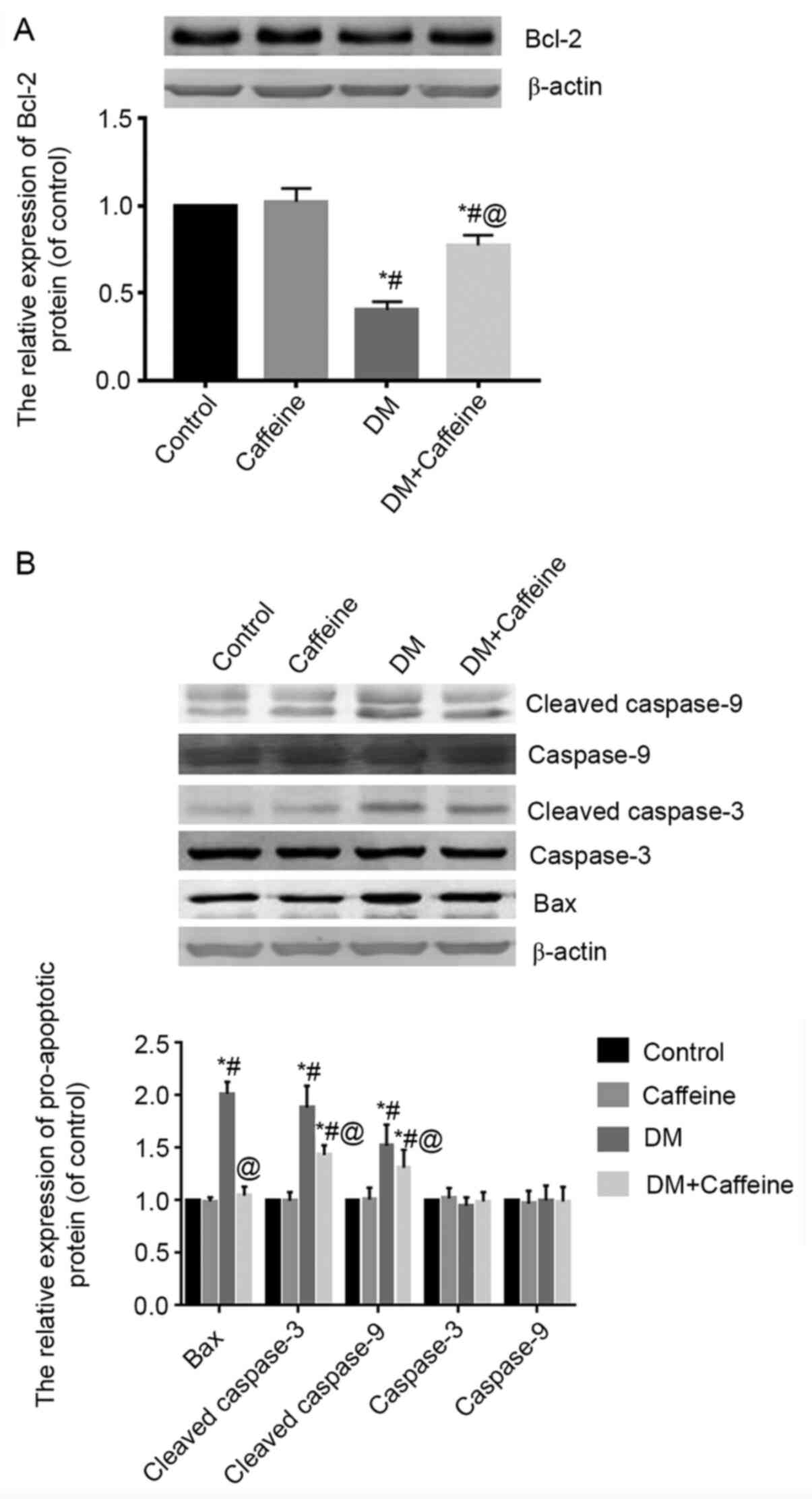|
1
|
Xu Y, Wang L, He J, Bi Y, Li M, Wang T,
Wang L, Jiang Y, Dai M, Lu J, et al: Prevalence and control of
diabetes in Chinese adults. JAMA. 310:948–959. 2013.PubMed/NCBI View Article : Google Scholar
|
|
2
|
Yuan Z, Tang Z, He C and Tang W: Diabetic
cystopathy: A review. J Diabetes. 7:442–447. 2015.PubMed/NCBI View Article : Google Scholar
|
|
3
|
Arrellano-Valdez F, Urrutia-Osorio M,
Arroyo C and Soto-Vega E: A comprehensive review of urologic
complications in patients with diabetes. Springerplus.
3(549)2014.PubMed/NCBI View Article : Google Scholar
|
|
4
|
Feifer A and Corcos J: Contemporary role
of suprapubic cystostomy in treatment of neuropathic bladder
dysfunction in spinal cord injured patients. Neurourol Urodyn.
27:475–479. 2008.PubMed/NCBI View Article : Google Scholar
|
|
5
|
Franz MJ, Bantle JP, Beebe CA, Brunzell
JD, Chiasson JL, Garg A, Holzmeister LA, Hoogwerf B, Mayer-Davis E,
Mooradian AD, et al: Evidence-based nutrition principles and
recommendations for the treatment and prevention of diabetes and
related complications. Diabetes Care. 26 (Suppl 1):S51–S61.
2003.PubMed/NCBI View Article : Google Scholar
|
|
6
|
Cho YS, Ko IG, Kim SE, Hwan L, Shin MS,
Kim CJ, Kim SH, Jin JJ, Chung JY and Kim KH: Caffeine enhances
micturition through neuronal activation in micturition centers. Mol
Med Rep. 10:2931–2936. 2014.PubMed/NCBI View Article : Google Scholar
|
|
7
|
Yi CR, Wei ZQ, Deng XL, Sun ZY, Li XR and
Tian CG: Effects of coffee and caffeine on bladder dysfunction in
streptozotocin-induced diabetic rats. Acta Pharmacol Sin.
27:1037–1043. 2006.PubMed/NCBI View Article : Google Scholar
|
|
8
|
Langdale CL, Thor KB, Marson L and Burgard
EC: Maintenance of bladder innervation in diabetes: A stereological
study of streptozotocin-treated female rats. Auton Neurosci.
185:59–66. 2014.PubMed/NCBI View Article : Google Scholar
|
|
9
|
WenBo W, Fei Z, YiHeng D, Wei W, TingMang
Y, WenHao Z, QianRu L and HaiTao L: Human umbilical cord
mesenchymal stem cells overexpressing nerve growth factor
ameliorate diabetic cystopathy in rats. Neurochem Res.
42:3537–3547. 2017.PubMed/NCBI View Article : Google Scholar
|
|
10
|
Liu YD, Zhang SC, Xue J, Wei ZQ, Shen BX
and Ding LC: Caffeine improves bladder function in
streptozotocin-induced diabetic rats. Neurourol Urodyn. 38:81–86.
2018.PubMed/NCBI View Article : Google Scholar
|
|
11
|
Kashyap M, Pore S, Yoshimura N and Tyagi
P: Constitutive expression Of NGF, P75(NTR) affected by bladder
distension and NGF antisense treatment. Life Sci. 148:93–98.
2016.PubMed/NCBI View Article : Google Scholar
|
|
12
|
Wada N, Shimizu T, Shimizu N, de Groat WC,
Kanai AJ, Tyagi P, Kakizaki H and Yoshimura N: The effect of
neutralization of nerve growth factor (NGF) on bladder and urethral
dysfunction in mice with spinal cord injury. Neurourol Urodyn.
37:1889–1896. 2018.PubMed/NCBI View Article : Google Scholar
|
|
13
|
Tonyali S, Ates D, Akbiyik F, Kankaya D,
Baydar D and Ergen A: Urine nerve growth factor (NGF) level,
bladder nerve staining and symptom/problem scores in patients with
interstitial cystitis. Adv Clin Exp Med. 27:159–163.
2018.PubMed/NCBI View Article : Google Scholar
|
|
14
|
Kashyap MP, Pore SK, de Groat WC,
Chermansky CJ, Yoshimura N and Tyagi P: BDNF overexpression in the
bladder induces neuronal changes to mediate bladder overactivity.
Am J Physiol Renal Physiol. 315:F45–F56. 2018.PubMed/NCBI View Article : Google Scholar
|
|
15
|
Kashyap MP, Roberts C, Waseem M and Tyagi
P: Drug targets in neurotrophin signaling in the central and
peripheral nervous system. Mol Neurobiol. 55:6939–6955.
2018.PubMed/NCBI View Article : Google Scholar
|
|
16
|
Parameswaran N, Disa J, Spielman WS,
Brooks DP, Nambi P and Aiyar N: Activation of multiple
mitogen-activated protein kinases by recombinant calcitonin
gene-related peptide receptor. Eur J Pharmacol. 389:125–130.
2000.PubMed/NCBI View Article : Google Scholar
|
|
17
|
Nirmal J, Tyagi P, Chuang YC, Lee WC,
Yoshimura N, Huang CC, Rajaganapathy B and Chancellor MB:
Functional and molecular characterization of hyposensitive
underactive bladder tissue and urine in streptozotocin-induced
diabetic rat. PLoS One. 9(e102644)2014.PubMed/NCBI View Article : Google Scholar
|
|
18
|
Daneshgari F, Liu G, Birder L,
Hanna-Mitchell AT and Chacko S: Diabetic bladder dysfunction:
Current translational knowledge. J Urol. 182 (Suppl 6):S18–S26.
2009.PubMed/NCBI View Article : Google Scholar
|
|
19
|
Li R, Wu Y, Zou S, Wang X, Li Y, Xu K,
Gong F, Liu Y, Wang J, Liao Y, et al: NGF attenuates high
glucose-induced ER stress, preventing schwann cell apoptosis by
activating the PI3K/Akt/GSK3β and ERK1/2 pathways. Neurochem Res.
42:3005–3018. 2017.PubMed/NCBI View Article : Google Scholar
|
|
20
|
Sun Z, Hu W, Yin S, Lu X, Zuo W, Ge S and
Xu Y: NGF protects against oxygen and glucose deprivation-induced
oxidative stress and apoptosis by up-regulation of HO-1 through
MEK/ERK pathway. Neurosci Lett. 641:8–14. 2017.PubMed/NCBI View Article : Google Scholar
|
|
21
|
Cao J, Wu Y, Liu G and Li Z:
Over-expression of BDNF inhibits angiotensin II-induced apoptosis
of cardiomyocytes in SD rats. Xi Bao Yu Fen Zi Mian Yi Xue Za Zhi.
34:218–224. 2018.PubMed/NCBI(In Chinese).
|
|
22
|
Qi G, Mi Y, Wang Y, Li R, Huang S, Li X
and Liu X: Neuroprotective action of tea polyphenols on oxidative
stress-induced apoptosis through the activation of the
TrkB/CREB/BDNF pathway and Keap1/Nrf2 signaling pathway in SH-SY5Y
cells and mice brain. Food Funct. 8:4421–4432. 2017.PubMed/NCBI View Article : Google Scholar
|
|
23
|
Ma YX, Guo Z and Sun T: CGRP inhibits
norepinephrine induced apoptosis with restoration of Bcl-2/Bax in
cultured cardiomyocytes of rat. Neurosci Lett. 549:130–134.
2013.PubMed/NCBI View Article : Google Scholar
|
|
24
|
Yang JH, Zhang YQ and Guo Z: Endogenous
CGRP protects retinal cells against stress induced apoptosis in
rats. Neurosci Lett. 501:83–85. 2011.PubMed/NCBI View Article : Google Scholar
|
|
25
|
Renault TT, Dejean LM and Manon S: A
brewing understanding of the regulation of Bax function by Bcl-xL
and Bcl-2. Mech Ageing Dev. 161:201–210. 2017.PubMed/NCBI View Article : Google Scholar
|
|
26
|
Vogel MW: Cell death, Bcl-2, Bax, and the
cerebellum. Cerebellum. 1:277–287. 2002.PubMed/NCBI View Article : Google Scholar
|
|
27
|
Song L, Gao LN, Wang J, Thapa S, Li Y,
Zhong XB, Zhao HW, Xiang XR, Zhang FG and Ji P: Stromal
cell-derived factor-1α alleviates calcium-sensing receptor
activation-mediated ischemia/reperfusion injury by inhibiting
caspase-3/caspase-9-induced cell apoptosis in rat free flaps.
Biomed Res Int. 2018(8945850)2018.PubMed/NCBI View Article : Google Scholar
|
|
28
|
Lan T, Zhao H, Xiang B, Wang J and Liu Y:
Suture compression induced midpalatal suture chondrocyte apoptosis
with increased caspase-3, caspase-9, Bad, Bak, Bax and Bid
expression. Biochem Biophys Res Commun. 489:179–186.
2017.PubMed/NCBI View Article : Google Scholar
|

















